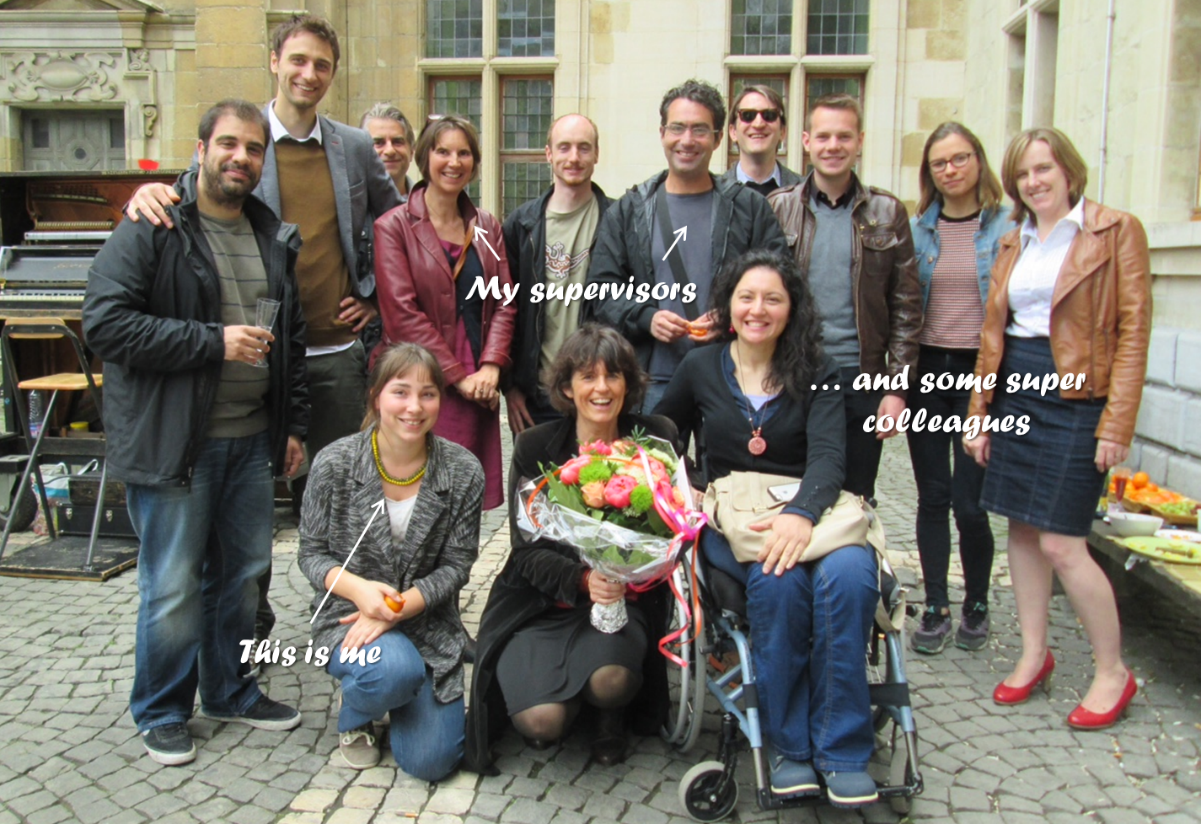Loren Pauwels: “I was told I could write about whatever I wanted, so here I am, full-on riding the waves of a classic coping mechanism (which is sometimes foolish – sometimes productive): it’s the day of the deadline, and I’m frantically and diagonally reading through the FBE research blogs from the last two years. All the while, I’m resisting the urge to google for several tutorial pages on “how to blog” – because that would really take it too far. Really.”
Last month, I was finally able to wrap up my 7,5 year-long PhD journey in the manner it deserved. I never expected it would take me that long. And I never expected that my public defence would be a fully online experience, where friends from abroad, old UAntwerp-buddies, new VUB-colleagues and even my 84-year old, unstoppable tech wizard of a grandpa could tune in. This virtual army of supporters made the day of my defence a really wonderful one.
I never thought I would want, or dare, to do a PhD. Part of my stereotype of an academic is that they have one very clear passion – a specialist pur sang. In contrast, I’m more of an overenthusiastic generalist. Someone who has a new hobby every year, but who – despite enjoying it – can’t seem to keep that hobby for longer than 6 months. I was, however, always interested in gaining insights about life, human behavior, and the complex societies that we organize ourselves in.
As that left open some 13 study options or more, my eventual choice for a BA and MA in Biology was coated with a sticky sauce of doubts and uncertainty. It wasn’t until I got a taste of the inherently multidisciplinary study of human cooperation through my master’s thesis, that looking for a PhD position became my goal. Funnily enough, it was when I wound up at the Faculty of Business and Economics at the University of Antwerp that the pieces really started falling into place.
With the use of methods like economic games, psychological primes, and fMRI techniques, my supervisors and I studied some of the drivers of prosocial decisions. Our main research question was whether and how individuals’ subjective experience of power affects their social decision-making, and whether this effect depends on individuals’ social values. Through connecting dots from different disciplines, I got my wish to build on my understanding of one of the most fundamental questions on human behaviour.
This experience, perhaps, can be compared to living in a house with a bunch of strongly opinionated roommates who each leave their mark on you in different ways. Experimental economics is that roommate who makes sure the house is well-organised and clean: she sees to it that your experimental design is properly incentivised and as unbiased as possible, and challenges you to formalise your theories of invisible decision-making processes (is it beliefs, preferences, or norms which are altered?). Social psychology is the one who feeds your soul with regular hot meals: she is most aware of the importance of individual differences in understanding human behavior, and kindly reminds you to make realistic assumptions about people’s computational abilities and the role of heuristics and emotion in decision-making. Finally, evolutionary biology is the one who regularly likes to shake things up by shouting down the hallway: ‘What even is rationality anyways!?’, as she lectures you on the bounds imposed by the very nature of different selection processes themselves.
Despite the fun house parties, my conversations with these roommates were often in need of a translator. At times when that translator was absent, I felt like a Swiss Army knife with blunt edges and missing parts – it’s hard to clip your nails with a mini screwdriver. My own experience tells me that nearly everyone in academia feels like an imposter (and yes, this probably also includes your brilliant professor). With this in mind, not fitting into a neatly-defined mold and having only relatively superficial knowledge in a few scientific domains (compared to your specialist colleagues) can seem extra challenging. It has been one of my great fortunes to be surrounded by supervisors and colleagues who were able to talk openly about insecurities, rejections, or downright fuck-ups. I truly hope that this culture of openness can further grow as an antidote for the isolation that such insecurities can breed amongst researchers.
Over the past years, the Faculty of Business and Economics has proved to be extremely welcoming to outside perspectives; it became an unexpected home for me – a self-declared generalist, biologist and rookie economist. I’ll be forever grateful for that. Please continue allowing the mutations of what it means to be an academic.


